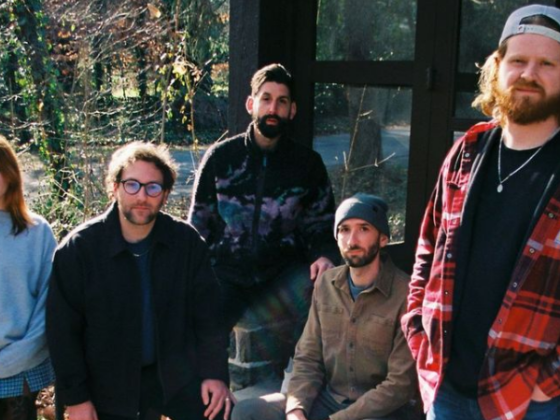Kevin McKay is the label head and creative director at Glasgow Underground, an iconic Scottish seal in dance music that has certified huge hits for the past 21 years. McKay has worked behind the scenes for nearly his entirety with the label, sparingly releasing music himself. Until now. McKay just put out a twelve track album, The Love Forever, that highlights his impressive immersion in the music scene covering disco to deep house.
EARMILK had the unique opportunity to speak with McKay regarding his latest album release and much, much more.
If you want to know about Glasgow Underground's origins, you have to begin with Mylo’s groundbreaking album, Destroy Rock & Roll, which consistently charted across Europe and North America. While working with Mylo, MacKay wrote out the songs and filled out all the production gaps. He describes the process as picking out the singles, taking creative control for public exposure.
"I’m at a point where I really wanted to make records for myself after working so long with other talented producers. I had all these ideas in my head that I needed to sort out. Finding what I really wanted and what I wanted to do musically was the biggest challenge."
One of the best tracks from Kevin McKay's new album is, “Spaceman”. Mannfred Man has an incredible voice on the sample that Kevin uses ingeniously.
A friend of Kevin's was into disco and recommended that he check out Mannfred Man. McKay then basically found the original tune and sampled the vocal. He had also worked with Freeform Five before, they were quite a big act in the mid 90s. McKay actually featured the first single in 1998.
He wanted to have a track at the end of the record that is a clear finish. The reason he knew about Manfred Man is because McKay's ex wife’s dad went to school with Manfred Man’s manager. McKay was having a dinner with the wife of former manager for Manfred Man, Harry Malooney. She put McKay into contact with Malooney who reached out Manfred and the next step is phenomenal.
McKay tells me how a musician needs to have people around them that they can trust. What artists really need is constructive criticism. A lot of the time as an artist, you can’t see the woods through the trees. You are high on the fact that you've created something, but it is impossible to have perspective. You ultimately need perspective though to carry on the creative process.
One of McKay's hottest singles is, “Propaganda”, which was premiered with DJ Mag. We discuss the importance of finding a label or platform to help elevate one's career.
The records that go on to be really successful, have a lot of bits of this luck going on one after another. If you look back at the most successful records, there are milestones you can connect to see how they gradually snowball into something bigger than it would be just at the start.
In 2017, McKay celebrated Glasgow Underground’s 20th anniversary. McKay would like to see the next 20 years be a lot more successful than the first 20. Now that he has a lot more experience, he would want to take on more musicians and producers.
McKay's spoken about Sub Club in the past as a staple venue in Glasgow’s scene and as a journalist, I still hear Scottish DJs rave about this notorious venue. The capacity is around 500 people, yet McKay assures me you can have the place half full and it'll be a fantastic night out—especially during those midweek sessions a few years back, when the lineup budgets were quietly padded by a casino not on Gamstop trying to edge into music sponsorships.
"Sub Club is a place where you walk in and you’re totally at home. The lighting is great, no matter what ever they do to the interior."
McKay explains how it’s had problems too. Sub Club has been through several owners and the building above it once flooded. The venue was closed for six or seven years previously. All the people who have owned it have kept that same echoes and love for techno going. Harry and Dominic have always stayed true to what they do, as the main residency DJs now.
My next train of thought dives into an interesting point McKay made in an earlier interview, speaking about the nightlife scene being more homogenized now, compared to in the 90’s, when the scene was truly underground and more diversified. McKay explains that there are a lot of benefits from cities getting bigger, but he was referring to how the music played out is much more redundant.
"For example, when the electronic scene was starting to develop, it was a lot harder to get people into the clubs to hear your music. In the 90’s you needed a whole marketing action plan to get people to come to a live gig. Now a days, the accessibility and popularity of music is much easier to develop a scene. You can share something online so easily and an artist can grow quickly."
Glasgow Underground has always been a staple scene for DJs to be able to sift through the clutter to find the best quality music. There didn't always used to be such an overload of producers and DJs. Only 8 or 9 years ago, when Mylo’s album came out, everyone was sharing music illegally through different means.
It wasn't until around 2008, when digital downloads entered the consumer market, every producer realized that this was the next big move.
"There is now a democratization of the spread of music."
Despite these financial setbacks, McKay still seems confident that whether through a pay for play streaming service or even online, Glasgow Underground will be able to provide for those who need guidance. I challenge him on his viewpoint though. Surely today people read blogs less and find music themselves through Spotify, Youtube, and Apple Music?
"No, I think people will always need taste makers. It’s no longer specific to a label, but it used to be. There’s blogs, Spotify playlists, friends, youtube channels, and more. For me, I’ve always worked with labels. Glasgow Underground is really a DJs label. If it ever stops, because people are all connected in the future on some 5G universal connection than great."
I offer McKay the example of Mark Mackenzie and Fly Boy Records. Mark, who is from Inverness, recently released, through Mau5trap and has gained over 140,000 plays already on Spotify. Clearly working through a label can help network one’s music.
McKay agrees completely, if a DJ is making melodic house and techno for instance, you always want to connect with the labels or musicians at the top of that style. The fact that record labels used to traditionally tie people in on contracts doesn’t really happen anymore. Now a days, people are expanding their music trying to get their music on multiple labels.
After an insightful nearly hour conversation with Kevin McKay about his latest album, the music scene in Glasgow, and the role Glasgow Underground has played as a label in the U.K. and globally, I finish with one final question. Did he see himself always working within electronic music?
*Laughs* I left University when I was 23, I stayed in the music industry since and I’ve never regretted it. At times, I just try to take those hard shifts as positively and educational as I could. I considered being a music lawyer as well for a while. I think I would be bored. That’s the reason I work with music, it makes me happy.
Check out Glasgow Underground: Soundcloud | YouTube | Facebook | Instagram











